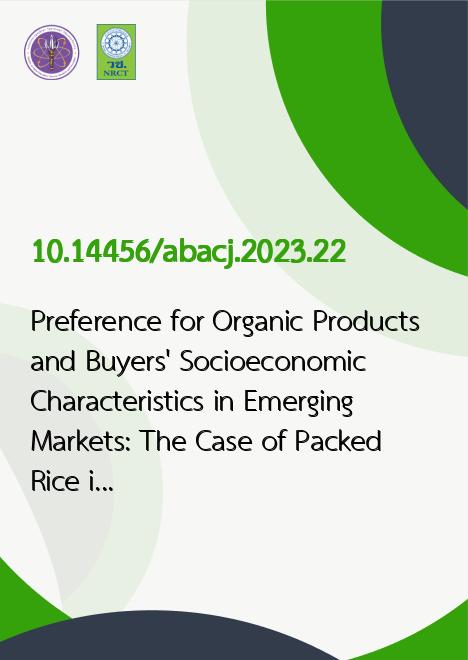
|
Preference for Organic Products and Buyers' Socioeconomic Characteristics in Emerging Markets: The Case of Packed Rice in China |
|---|---|
| รหัสดีโอไอ | |
| Creator | Zhuoran Zhang |
| Title | Preference for Organic Products and Buyers' Socioeconomic Characteristics in Emerging Markets: The Case of Packed Rice in China |
| Contributor | Bing Zhu, Shih-tse Lo, Zhizhong Kai |
| Publisher | Assumption University |
| Publication Year | 2566 |
| Journal Title | ABAC Journal |
| Journal Vol. | 43 |
| Journal No. | 2 |
| Page no. | 176-187 |
| Keyword | organic product, emerging markets, product attributes, discrete choice modeling |
| URL Website | www.abacjournal.au.edu |
| Website title | ABAC JOURNAL |
| ISSN | 0858-0855 |
| Abstract | Organic products have been popular in the developed world, and scholars have long explored the acceptance, preference, and perceived benefits of organic products in these affluent countries. However, how and to what extent the consumers in developing countries acquire a taste for organic products is not well understood. Moreover, it remains unclear which segment of the population in these countries is more susceptible to organic products. The study aims to comprehend consumers in emerging markets whether they exhibit any preference for organic food products. We focus on the most prominent emerging economy—China—to investigate whether and to what extent its consumers develop a taste for organic rice over non-organic. Our choice of rice is founded on the fact that rice is the staple food for many low- and middle-income countries, and typically employs traditional farming, which heavily uses inorganic pesticides and synthetic fertilizers. It is, thus, advantageous to explore the Chinese rice market and assess its rice consumers' acceptance or preference for organic products. We conducted a buyer survey that subjects the participants to a choice model experiment. The participants rank-ordered four hypothetical packed-rice products exhibiting four key product characteristics: organic label, price, package size, and product origin. We analyzed the gathered data through several rank-ordered logit regressions. We found that Chinese packed-rice buyers were yet to develop a taste for organic products. Instead, there existed distaste in general. Such distaste was similar in size between high- and low-income groups but more pronounced for the old or those with no tertiary education or males. Consumers generally were sensitive to price changes, except older individuals. Such individuals, or those only with a grade school education level, or males preferred small packages. Imported rice from Thailand was not well received, but the high-income or young or female population appeared less resistant. To our surprise, the acceptance or preference level of organic rice in China did not differ between the high-income and low-income groups. Such a finding suggested that the preference for organic products might not develop along with a growing economy and increases in the per capita income. Our results indicated that organic products and agriculture suppliers should develop strategies to raise awareness and cultivate a taste for such products effectively. |